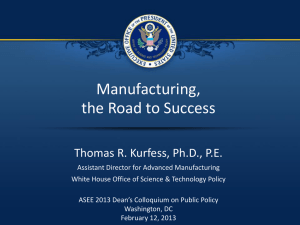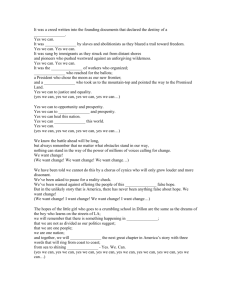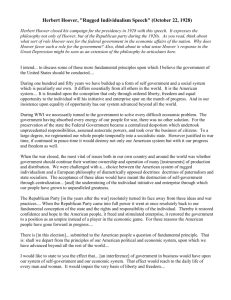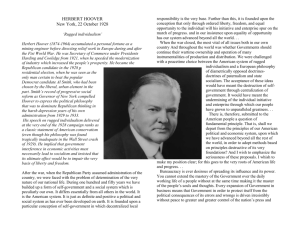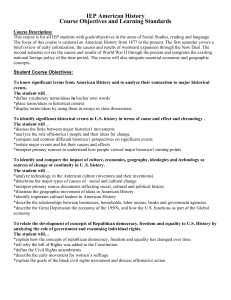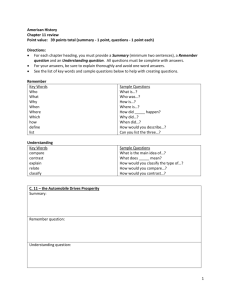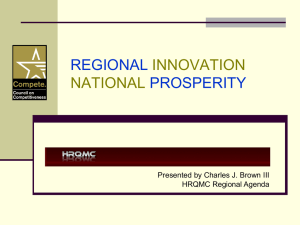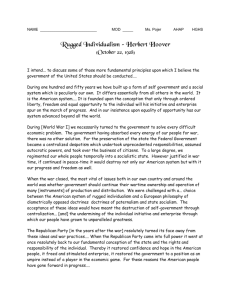Herbert Hoover 1927 on abolition of poverty
advertisement
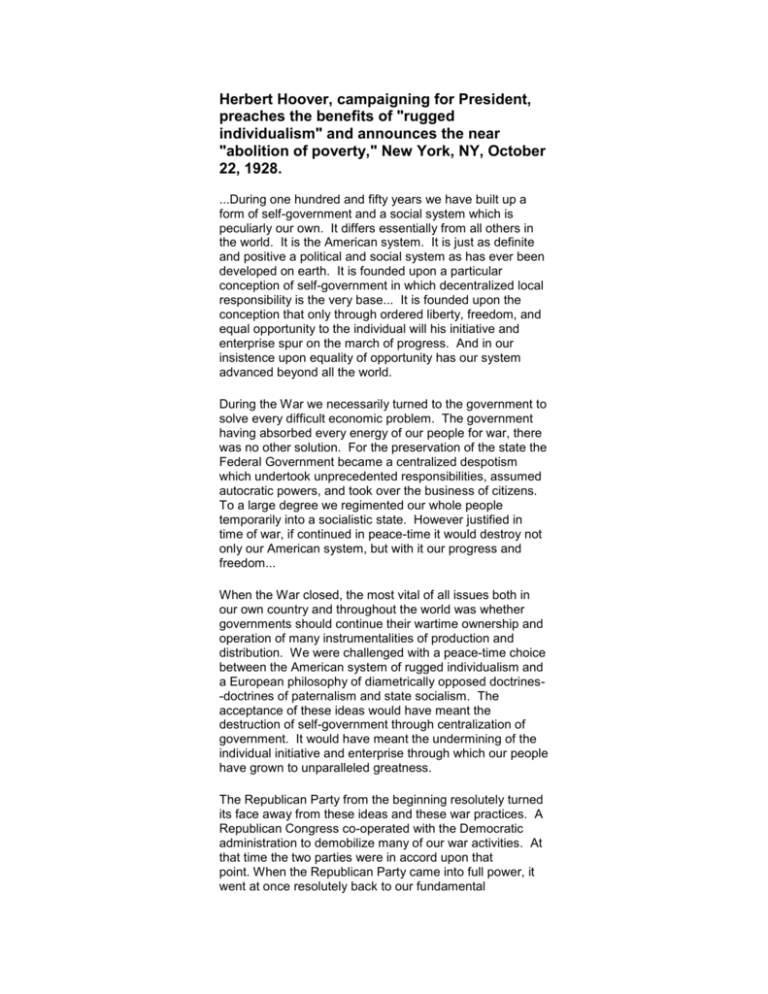
Herbert Hoover, campaigning for President, preaches the benefits of "rugged individualism" and announces the near "abolition of poverty," New York, NY, October 22, 1928. ...During one hundred and fifty years we have built up a form of self-government and a social system which is peculiarly our own. It differs essentially from all others in the world. It is the American system. It is just as definite and positive a political and social system as has ever been developed on earth. It is founded upon a particular conception of self-government in which decentralized local responsibility is the very base... It is founded upon the conception that only through ordered liberty, freedom, and equal opportunity to the individual will his initiative and enterprise spur on the march of progress. And in our insistence upon equality of opportunity has our system advanced beyond all the world. During the War we necessarily turned to the government to solve every difficult economic problem. The government having absorbed every energy of our people for war, there was no other solution. For the preservation of the state the Federal Government became a centralized despotism which undertook unprecedented responsibilities, assumed autocratic powers, and took over the business of citizens. To a large degree we regimented our whole people temporarily into a socialistic state. However justified in time of war, if continued in peace-time it would destroy not only our American system, but with it our progress and freedom... When the War closed, the most vital of all issues both in our own country and throughout the world was whether governments should continue their wartime ownership and operation of many instrumentalities of production and distribution. We were challenged with a peace-time choice between the American system of rugged individualism and a European philosophy of diametrically opposed doctrines-doctrines of paternalism and state socialism. The acceptance of these ideas would have meant the destruction of self-government through centralization of government. It would have meant the undermining of the individual initiative and enterprise through which our people have grown to unparalleled greatness. The Republican Party from the beginning resolutely turned its face away from these ideas and these war practices. A Republican Congress co-operated with the Democratic administration to demobilize many of our war activities. At that time the two parties were in accord upon that point. When the Republican Party came into full power, it went at once resolutely back to our fundamental conception of the state and the rights and responsibilities of the individual. Thereby it restored confidence and hope in the American people, it freed and stimulated enterprise, it restored the government to its position as an umpire instead of a player in the economic game. For these reasons, the American people have gone forward in progress while the rest of the world has halted, and some countries have even gone backwards. If anyone will study the causes of retarded recuperation in Europe, he will find much of it due to stifling of private initiative on one hand, and overloading of the government with business on the other. There has been revived in this campaign, however, a series of proposals which, if adopted, would be a long step toward the abandonment of our American system and a surrender to the destructive operation of governmental conduct of commercial business. Because the country is faced with difficulty and doubt over certain national problems--that is, prohibition, farm relief, and electrical power--our opponents propose that we must thrust government a long way into the businesses which give rise to these problems. In effect, they abandon the tenets of their own party and turn to state socialism as a solution for the difficulties presented by all three. It is proposed that we shall change from prohibition to the state purchase and sale of liquor. If their agricultural relief program means anything, it means that the government shall directly or indirectly buy and sell and fix prices of agricultural products. And we are to go into the hydro-electric power business. In other words, we are confronted with a huge program of government in business... The effect would reach to the daily life of every man and woman. It would impair the very basis of liberty and freedom not only for those left outside the fold of expanded bureaucracy but for those embraced within it. Let us first see the effect upon self-government. When the Federal Government undertakes to go into commercial business, it must at once set up the organization and administration of that business, and it immediately finds itself in a labyrinth, every alley of which leads to the destruction of selfgovernment... The first problem of the government about to adventure in commercial business is to determine a method of administration. It must secure leadership and direction. Shall this leadership be chosen by political agencies, or shall we make it elective? The hard practical fact is that leadership in business must come through the sheer rise in ability and character. That rise can only take place in a free atmosphere of competition. Competition is closed in a bureaucracy. Political agencies are feeble channels through which to select able leaders to conduct commercial business. Government, in order to avoid the possible incompetence, corruption, and tyranny of too great authority in individuals entrusted with commercial business, inevitably turns to boards and commissions. To make sure that there are checks and balances, each member of such boards and commissions must have equal authority. Each has his separate responsibility to the public, and at once we have the conflict of ideas and the lack of decision which would ruin any commercial business. It has contributed greatly to the demoralization of our shipping business. Moreover, these commissions must be representative of different sections and different political parties, so that at once we have an entire blight upon coordinated action within their ranks which destroys any possibility of effective administration... Thus every time the Federal Government goes into a commercial business, five hundred and thirty-one Senators and Congressmen become the actual board of directors of that business. Every time a state government goes into business, one or two hundred state senators and legislators become the actual directors of that business. Even if they were supermen and if there were no politics in the United States, no body of such numbers could competently direct commercial activities; for that requires initiative, instant decision, and action. It took Congress six years of constant discussion to even decide what the method of administration Muscle Shoals should be... During the war the government found it necessary to operate the railways. That operation continued until after the war. In the year before being freed from government operation they were not able to meet the demands for transportation. Eight years, later we find them under private enterprise transporting fifteen per cent more goods and meeting every demand for service. Rates have been reduced by fifteen percent and net earnings increased from less than one percent on their valuation to about five percent. Wages of employees have improved by thirteen percent. The wages of railway employees are today one hundred and twenty-one percent above pre-war, while the wages of government employees are today only sixty-five percent above pre-war. That should be a sufficient commentary upon the efficiency of government operation... The government in commercial business does not tolerate amongst its customers the freedom of competitive reprisals to which private business is subject. Bureaucracy does not tolerate the spirit of independence; it spreads the spirit of submission into our daily life and penetrates the temper of our people not with the habit of powerful resistance to wrong but with the habit of timid acceptance of irresistible might. Bureaucracy is ever desirous of spreading its influence and its power. You cannot extend the mastery of the government over the daily working life of a people without at the same time making it the master of the people's souls and thoughts. Every expansion of government in business means that government, in order to protect itself from the political consequences of its errors and wrongs, is driven irresistibly without peace to greater and greater control of the nation's press and platform. Free speech does not live many hours after free industry and free commerce die. It is a false liberalism that interprets itself into the government operation of commercial business. Every step of bureaucratizing of the business of our country poisons the very roots of liberalism--that is, political equality, free speech, free assembly, free press, and equality of opportunity... True liberalism is a force truly of the spirit, a force proceeding from the deep realization that economic freedom cannot be sacrificed if political freedom is to be preserved. Even if governmental conduct of business could give us more efficiency instead of less efficiency, the fundamental objection to it would remain unaltered and unabated. It would destroy political equality. It would increase rather than decrease abuse and corruption. It would stifle initiative and invention. It would undermine the development of leadership. It would cramp and cripple the mental and spiritual energies of our people. It would extinguish equality and opportunity. It would dry up the spirit of liberty and progress. For these reasons primarily it must be resisted... I feel deeply on this subject because during the War I had some practical experience with governmental operation and control. I have witnessed, not only at home but abroad, the many failures of government in business. I have seen its tyrannies, its injustices, its destructions of self-government, its undermining of the very instincts which carry our people forward to progress. I have witnessed the lack of advance, the lowered standards of living, the depressed spirits of people working under such a system. My objection is based not upon theory or upon a failure to recognize wrong or abuse, but I know the adoption of such methods would strike at the very roots of American life and would destroy the very basis of American progress... In the last fifty years we have discovered that mass production will produce articles for us at half the cost they required previously. We have seen the resultant growth of large units of production and distribution. This is big business. Many businesses must be bigger, for our tools are bigger, our country is bigger... The American people, from bitter experience, have a rightful fear that great business units might be used to dominate our industrial life and by illegal and unethical practices destroy equality of opportunity. Years ago the Republican administration established the principle that such evils could be corrected by regulation. It developed methods by which abuses could be prevented while the full value of industrial progress could be retained for the public. It insisted upon the principle that when great public utilities were clothed with the security of partial monopoly, whether it be railways, power plants, telephones, or what not, then there must be the fullest and most complete control of rates, services, and finances by government or local agencies. It declared that these businesses must be conducted with glass pockets. As to our great manufacturing and distributing industries, the Republican party insisted upon the enactment of laws that not only would maintain competition but would destroy conspiracies to destroy the smaller units, or dominate and limit the equality of opportunity amongst our people... And what have been the results of our American system? Our country has become the land of opportunity to those born without inheritance, not merely because of the wealth of its resources and industry, but because of this freedom of initiative and enterprise. Russia has natural resources equal to ours. Her people are equally industrious, but she has not had the blessings of one hundred and fifty years of our form of government and of our social system. By adherence to the principles of decentralized selfgovernment, ordered liberty, equal opportunity, and freedom to the individual, our American experiment in human welfare has yielded a degree of well-being unparalleled in all the world. It has come nearer to the abolition of poverty, to the abolition of fear of want, than humanity has ever reached before. Progress of the past seven years is the proof of it. This alone furnishes the answer to our opponents, who ask us to introduce destructive elements into the system by which this has been accomplished. _______________ We were challenged with a choice between the American system of rugged individualism and a European philosophy of state socialism. _______________ Let us see what this system has done for us in our recent years of difficult and trying reconstruction and then solemnly ask ourselves if we now wish to abandon it. As a nation we came out of the War with great losses. We made no profits from it. The apparent increases in wages were at that time fictitious. We were poorer as a nation when we emerged from the War. Yet during these last eight years we have recovered from these losses and increased our national income by over one-third, even if we discount the inflation of the dollar. That there has been a wide diffusion of our gain in wealth and income is marked by a hundred proofs. I know of no better test of the improved conditions of the average family than the combined increase in assets of life and industrial insurance, building and loan associations, and savings deposits. These are the savings banks of the average man. These agencies alone have, in seven years, increased by nearly one-hundred percent, to the gigantic sum of over fifty billions of dollars, or nearly one-sixth of our whole national wealth. We have increased in home ownership, we have expanded the investments of the average man. In addition to these evidences of larger savings, our people are steadily increasing their spending for higher standards of living. Today there are almost nine automobiles for each ten families, where seven and one-half years ago, only enough automobiles were running to average less than four for each ten families. The slogan of progress is changing from the full dinner pail to the full garage. Our people have more to eat, better things to wear, and better homes. We have even gained in elbow room, for the increase of residential floor space is over twenty-five percent with less than ten percent increase in our number of people. Wages have increased, the cost of living has decreased. The job of every man and woman has been made more secure. We have in this short period decreased the fear of poverty, the fear of unemployment, the fear of old age; and these are fears that are the greatest calamities of human kind. All this progress means far more than greater creature comforts. It finds a thousand interpretations into a greater and fuller life. A score of new helps save the drudgery of the home. In seven years, we have added seventy per cent to the electric power at the elbows of our workers and further promoted them from carriers of burdens to directors of machines. We have steadily reduced the sweat in human labor. Our hours of labor are lessened; our leisure has increased. We have expanded our parks and playgrounds. We have nearly doubled our attendance at games. We pour into outdoor recreation in every direction. The visitors at our national parks have trebled, and we have so increased the number of sportsmen fishing in our streams and lakes that the longer time between bites is becoming a political issue. In these seven and one-half years, the radio has brought music and laughter, education and political discussion to almost every fireside. Springing from our prosperity with its greater freedom, its vast endowment of scientific research, and the greater resources with which to care for public health, we have, according to our insurance actuaries, during this short period since the War, lengthened the average span of life by nearly eight years. We have reduced infant mortality, we have vastly decreased the days of illness and suffering in the life of every man and woman. We have improved the facilities for the care of the crippled and helpless and deranged. From our increasing resources, we have expanded our educational system in eight years from an outlay of twelve hundred-millions to twenty-seven hundred-millions of dollars. The education of our youth has become almost our largest and certainly our most important activity. From our greater income, and thus our ability to free youth from toil, we have increased the attendance in our grade schools by fourteen percent, in our high schools by eighty percent, and in our institutions of higher learning by ninetyfive percent. Today we have more youth in these institutions of higher learning twice over than all the rest of the world put together. We have made notable progress in literature, in art, and in public taste. We have made progress in the leadership of every branch of American life. Never in our history was the leadership in our economic life more distinguished in its abilities than today, and it has grown greatly in its consciousness of public responsibility. Leadership in our professions and in moral and spiritual affairs of our country was never of a higher order. And our magnificent educational system is bringing forward a host of recruits for the succession to this leadership. I do not need to recite more figures and more evidence. I cannot believe that the American people wish to abandon, or in any way to weaken, the principles of economic freedom and self-government which have been maintained by the Republican Party, and which have produced results so amazing and so stimulating to the spiritual as well as to the material advance of the nation. Your city has been an outstanding beneficiary of this great progress and of these safeguarded principles. With its suburbs it has, during the last seven and one-half years, grown by over a million and a half of people until it has become the largest metropolitan district of all the world. Here you have made abundant opportunity, not only for the youth of the land, but for the immigrant from foreign shores. This city is the commercial center of the United States. It is the commercial agent of the American people. It is a great organism of specialized skill and leadership in finance, industry, and commerce which reaches every spot in our country. Its progress and its beauty are the pride of the whole American people. It leads our nation in its benevolences to charity, to education, and to scientific research. It is the center of art, music, literature, and drama. It has come to have a more potent voice than any other city in the United States. But when all is said and done, the very life, progress, and prosperity of this city is wholly dependent on the prosperity of the 115,000,000 people who dwell in our mountains and valleys across the three-thousand miles to the Pacific Ocean. Every activity of this city is sensitive to every evil and every favorable tide that sweeps this great nation of ours. Be there a slackening of industry in any place, it affects New York far more than any other part of the country. In a time of depression, one-quarter of all the unemployed in the United States can be numbered in this city. In a time of prosperity, the citizens of the great interior of our country pour into your city for business and entertainment at the rate of one hundred and fifty thousand a day. In fact, so much is this city the reflex of the varied interests of our country, that the concern of every one of your citizens for national stability, for national prosperity, for national progress, for preservation of our American system is far greater than that of any other single part of our country. We still have great problems if we would achieve the full economic advancement of our country. In these past few years, some groups in our country have lagged behind others in the march of progress. I refer more particularly to those engaged in the textile, coal, and agricultural industries. We can assist in solving these problems by cooperation of our government. To the agricultural industry we shall need to advance initial capital to assist them to stabilize their industry. But this proposal implies that they shall conduct it themselves, and not by the government. It is in the interest of our cities that we shall bring agriculture and all industries into full stability and prosperity. I know you will gladly cooperate in the faith that in the common prosperity of our country lies its future. In bringing this address to a conclusion, I should like to restate to you some of the fundamental things I have endeavored to bring out. The foundations of progress and prosperity are dependent as never before upon the wise policies of government, for government now touches at a thousand points the intricate web of economic and social life. Under administration by the Republican Party, in the last seven and one-half years, our country as a whole has made unparalleled progress, and this has been in generous part reflected to this great city. Prosperity is no idle expression. It is a job for every worker; it is the safety and the safeguard of every business and every home. A continuation of the policies of the Republican Party is fundamentally necessary to the further advancement of this progress and to the further building up of this prosperity. I have dwelt at some length on the principles of relationship between the government and business. I make no apologies for dealing with this subject. The first necessity of any nation is the smooth functioning of the vast business machinery for employment, feeding, clothing, housing, and providing luxuries and comforts to a people. Unless these basic elements are properly organized and function, there can be no progress in business, in education, literature, music, or art. There can be no advance in the fundamental ideals of a people. A people cannot make progress in poverty. I have endeavored to present to you that the greatness of America has grown out of a political and social system and a method of control of economic forces distinctly its own-our American system--which has carried this great experiment in human welfare farther than ever before in all history. We are nearer today to the ideal of the abolition of poverty and fear from the lives of men and women than ever before in any land. And I again repeat that the departure from our American system by injecting principles destructive to it, which our opponents propose, will jeopardize the very liberty and freedom of our people and will destroy equality of opportunity, not alone to ourselves but to our children. My conception of America is a land where men and women may walk in ordered freedom in the independent conduct of their occupations; where they may enjoy the advantages of wealth, not concentrated in the hands of the few, but spread through the lives of all; where they build and safeguard their homes, and give to their children the fullest advantages and opportunities of American life; where every man shall be respected in the faith that his conscience and his heart direct him to follow; where a contented and happy people, secure in their liberties, free from poverty and fear, shall have the leisure and impulse to seek a fuller life. Some may ask where all this may lead, beyond mere material progress. It leads to a release of the energies of men and women from the dull drudgery of life to a wider vision and a higher hope. It leads to the opportunity for greater and greater service, not alone from man to man in our own land, but from our country to the whole world. It leads to an America, healthy in body, healthy in spirit, unfettered, youthful, eager--with a vision searching beyond the farthest horizons, with an open mind, sympathetic and generous. It is to these higher ideals and for these purposes that I pledge myself and the Republican Party. In 1924, the federal government, working with local developers, began a massive construction project to build a navigable river passage and hydro-electric dam in Muscle Shoals, Alabama, where the Tennessee river drops 130 feet over a series of cataracts and shoals. click here to return to background
